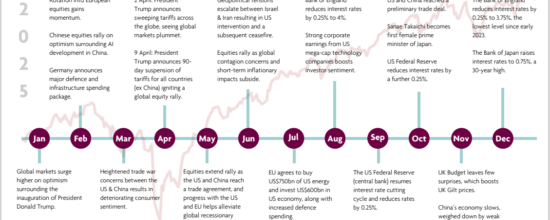Investment perspectives - Markets, tariffs and the road ahead
Markets have rallied after the US paused new tariffs for most countries, easing fears of a full-scale trade war. But uncertainty remains.
Here’s what the Omnis team is watching and why staying invested still matters.
What’s happened?
Markets have been on a rollercoaster. Over the past week, global equities fell sharply amid fears of a full-scale trade war. But then came a dramatic turn – the US announced a 90-day pause on new tariffs for countries willing to negotiate, triggering one of the strongest market rallies in recent history. Following the latest Omnis Live webinar, and with further reflections from our Chief Investment Officer Andrew Summers, we’re sharing our view on what’s happening, what it means for investors and why maintaining a long-term perspective remains more important than ever
A volatile environment and a sharp rebound
Both equity and bond markets reacted negatively to the initial US tariff announcement on 2 April, given the likely drag on growth and the inflationary impact it would have had. So it’s no surprise that equities rallied strongly once the most disruptive element – the so-called reciprocal tariffs – was paused. “The good news is that the US administration has shown little appetite for the sort of broadbased global trade war that would have triggered further material falls in markets,” said Andrew Summers, Chief Investment Officer at Omnis. “The bad news is that some damage has already been done, particularly to the US, which was already slowing, and to the UK and Europe, which had only recently started showing signs of improvement.” Even with the pause, this episode has been a setback. It’s likely that the shock of the original announcement, combined with already-elevated uncertainty, will have dented both consumer and business confidence – and that could affect economic activity over the coming quarters.
Uncertainty remains, but risks are more balanced
While the most damaging tariffs are on hold, some remain in place – particularly those aimed
at China. These are likely to push up prices in the US, placing additional strain on an economy already facing slower growth. This situation creates a difficult balancing act for central banks, who must weigh the need to control inflation against the need to support growth. “Our view was that calmer heads would prevail,” said Summers, “and for now, that seems to have been the right call. However, it’s worth remembering that the tariffs are only paused and not cancelled. The stand-off between the US and China appears to be growing more entrenched. While the trade volume between them is relatively small compared with the size of their economies, the broader uncertainty may still hurt sentiment globally. The overall damage – and any spillover effects – is still being assessed, and that means risks remain in both directions.
Markets move fast so should we react?
The past few weeks have seen wild swings in sentiment. While these movements may offer short-term trading opportunities for the most active investors, for most people they’re more likely to cause confusion than create value. “These gyrations may have offered opportunities for traders,” Summers noted, “but for most investors they simply risk getting whip-sawed and left behind.” Rather than reacting to every market movement, Omnis continues to focus on evidence and fundamentals, knowing that the full impact of policy changes often takes time to become clear. That means watching the data closely, analysing risks carefully and acting only when it makes long-term sense to do so.
Why staying invested really matters
Recent volatility has served as a vivid reminder that markets don’t just fall – they can bounce back quickly too. Investors who try to time their exits and re-entries often miss these sharp recoveries, harming long-term returns. “It’s unwise to react to one-day moves, however large,” said Summers. “Being just a little wrong with timing can be costly.” The lesson? Don’t let headlines dictate your investment decisions. Stick to your plan and focus on long-term goals.


